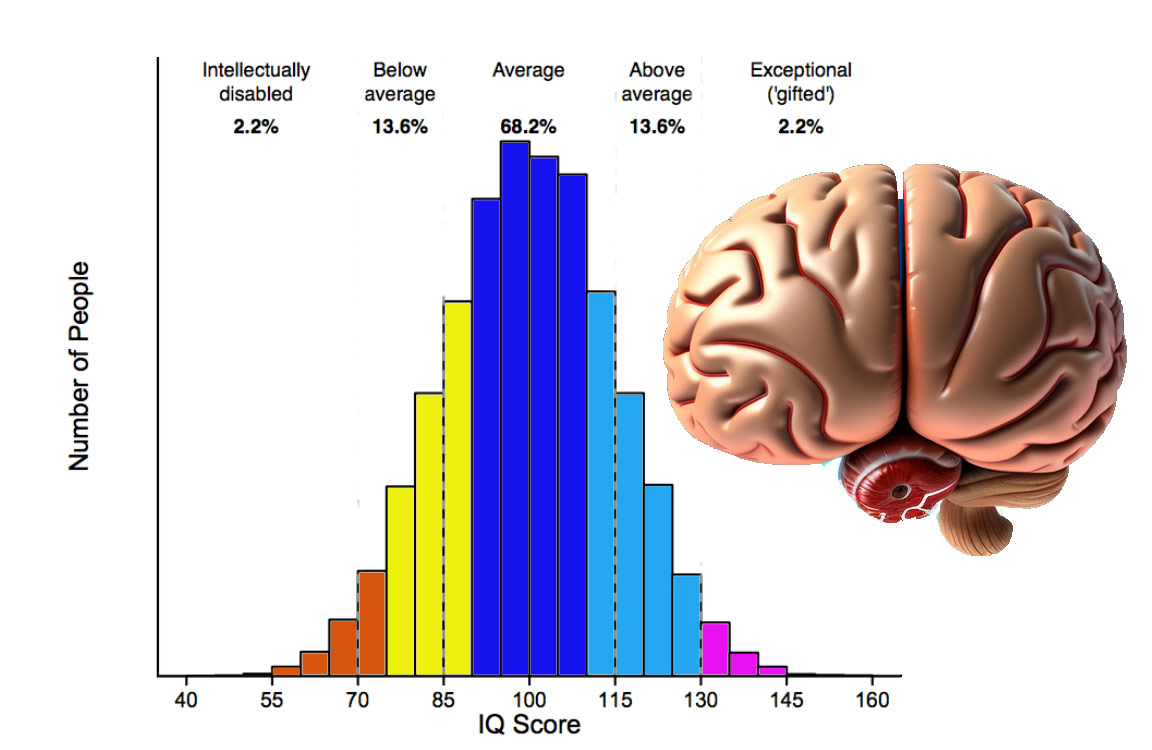IQ Score
The transition of society into a knowledge-based one has created new opportunities for the intelligent. Selection of right people has become a challenge to institutions and organizations looking for such personnel. IQ score is considered to be indicative of a person's mental abilities.
What started as an exercise to identify children with lower intelligence so as to provide them with special education programs has now become a recognized testing model for adults too. An IQ test evaluates various skills such as spatial, logical reasoning, general knowledge levels, pattern recognition and classification skills. The IQ test scores are accepted to be reliable indicators of general cognitive ability and consequently intellectual potential.
What is IQ?
Intelligence of a person is difficult to define. Hence IQ scores are generally considered to be an objective measure in determining an individual's intelligence. Intelligent Quotient or IQ is a number or score determined by a person's performance in a set of tests specially developed and standardized for this purpose. It is found that 50% of the population normally has IQ ranging from 90 to 110 whereas 25% fall in the higher IQ group and 25% in the lower IQ group.
History of IQ tests
In the 19th century, British scientist Sir Frances Galton was one of the pioneers in investigating the differences in mental capabilities of individuals. This was followed by several studies that revealed that intelligence of a person had a definite role to play in his or her academic success. One of his students, James McKeen Cattell first took the idea of intelligence testing to America.
Asked by the French government, in 1905 Alfred Binet a French psychologist and his colleague Theodore Simon developed a test to help identify those children who had difficulty in learning. These tests based on memory, reasoning, vocabulary and problem solving were found to be better to determine a child's intelligence than those of Galton. Binet-Simon tests led to understanding of mental age. Though children follow the same pattern of development, the rate of development may vary from one child to another.
A child whose IQ score proves to be that of a ten year-old, even if he or she is below that age the mental age of the child is considered as ten. Lewis Terman, a Stanford University psychologist developed the Stanford Revision of Binet-Simon Scale, more popularly known as the Stanford -Binet test in 1916.
For many years, this was the most commonly used test. Terman coined the term Intelligent Quotient in 1912. The IQ of a student was determined by the quotient of his or her mental age divided by his/her actual age. In modern days, the WISC test which was originally developed by David Wechler is popularly used. The present day version WISC IV contains 15 subtests in which 10 are core subtests.
Four summary scores of verbal comprehension, perceptual reasoning or visual problem solving, working memory and processing speed as also the Full Scale IQ are taken into account for the sub tests. Learning disability of a person is indicated by the differentials in the scores of different tests. Improved educational methods often improve an individual's Full Scale IQ as the person ages.
Determination of IQ Score
Today, intelligent tests do not use the IQ formula, i.e. taking the quotient of a person's mental age divided by the chronological age and multiplied by 100 (to avoid decimals). IQ scores compare individual's mental potential with other test -takers of the same age, assuming that the average IQ score as 100 and a percentile arrived at.
Average IQ Score
The average IQ test score is considered to be between 90 and 110 and around 50% of the population of these tests conducted fall under this zone. The remaining 50% of the population fall on either side of the normal curve indicating that around 25% are below average while the other 25% on the other side of the mean are above average. Some may still argue that this is only a rough estimate. Generally, the results of any IQ test reveal that they follow a course of normal distribution and hence represented in a graphic way through a normal or bell curve.

IQ is not expressed as a percentage but as percentiles. If an individual answers half of the questions correctly in a test of 100 questions, he would get 50%. Percentile is different from this. It refers to the number which the individual has got with respect to others' who had taken the same test. If a person answers 40 questions correctly in a test which contains 50 questions and every other test-taker answers more than that, he or she would be rated to be low in percentile, though the individual had answered 80% of the questions correctly.
| IQ | Percentile |
|---|---|
| 65 | 01 |
| 70 | 02 |
| 75 | 05 |
| 80 | 09 |
| 85 | 16 |
| 90 | 25 |
| 95 | 37 |
| 100 | 50 |
| 105 | 63 |
| 110 | 75 |
| 115 | 84 |
| 120 | 91 |
| 125 | 95 |
| 130 | 98 |
| 135 | 99 |
IQ Test Score
There are various tests conducted by different agencies and even some web sites to determine the IQ of a person. There are some tests in which around 13 sub-categories are tested for this purpose. The areas of testing include visual, vocabulary, arithmetic, spatial, general knowledge, logical, spelling, intuition, rote utilization, geometric, algebraic, short term memory and computational speed.
The scores of these tests are analyzed separately for each category and a general IQ score is arrived at. A good IQ test does not measure your quantity of knowledge but seeks to probe into your ability to understand ideas. While selecting personnel for a career some of the following tests are administered to the candidates to determine their IQ.
- The ability to organize a collection of things according to similarities and differences is noted as classification skill
- Visualization and orientation of objects in space are determined as spatial skills.
- The ability to arrive at rational conclusions employing deductions are classified as logical reasoning.
- In pattern recognition, the ability of an individual to create order out of chaos is measured.
- The mental skills gained through education and experience, are gauged using general knowledge test. This test serves as a good indicator of overall intelligence of a person.
Interpretation of IQ Scores
Interpretation of IQ test scores has resulted in classification of these data. IQ test scores can be classified descriptively as shown in the table below;
| IQ Level (Intervals) |
Description | Population % |
|---|---|---|
| 130 and above | Genius | 2.2% |
| 120-129 | Superior | 6.7% |
| 110-119 | High Average | 16.1% |
| 90 - 109 | Average | 50% |
| 80 - 89 | Low Average | 16.1% |
| 70 - 79 | Borderline Retardation | 6.7% |
| Below 70 | Very Low | 2.2% |
Average IQ score and Profession: This table clearly indicates a pattern of normal distribution of IQ scores. In the context of employment too, an analysis of various IQ tests show that highly qualified personnel like top civil servants, professors and scientists have an IQ of above 140. Physicians, surgeons, lawyers and engineers come next with 130. For school teachers, pharmacists, accountants, nurses, managers and stenographers, their IQ is found to be 120.
While employees like foremen, clerks, telephone operators, salesmen, policemen and electricians scored 110, workers such as machine operators, welders, butchers and scored around 100. Some of the workers like carpenters, cooks, bakers, small farmers and van drivers scored somewhat below 100. Still lower, the IQ was found as 90 for laborers, gardeners, miners, sorters and factory packers. According to some psychologists, the IQ of an individual varies according to their socio-economic back ground, education and environment.
IQ and Education: Alan Kaufman in his book 'IQ testing 101' has compiled some interesting statistics on average IQ score based on educational levels. Post graduates and doctoral candidates topped the chart with 125+ scores, followed by college degree graduates with 112-115 and high school graduates with a typical average score of 100. This clearly indicates a strong correlation between the years of education and higher IQ scores.
Another study indicates that an higher IQ is likely to result in elevation in occupational groups - other things being equal. Typically professionals and technically skilled tend to have IQ scores of 112 or higher, managers and administrators in the next rung of 104 while the clerical cadres, craftsmen, skilled workers and sales workers with 101 and semi-skilled workers averaging around 92.
Using descriptive classification of IQ needs a very cautious approach. IQ of a person roughly indicates one's mental abilities and potentials. Intelligence tests today do not take into account other factors that can influence intelligence. Similarly, it is also possible that a person may get a different test score in a different test. Though IQ tests are valuable, the overrated values should not discourage a person.
Since many aspects of life are important to be successful and happy, one need not be alarmed to find his or her IQ score not as satisfactory as expected. It is of interest to many whether a person can increase his/her IQ score. Typically adult IQ test scores don't wary much over time. In the case of children, it is believed that early intellectual stimulation can boost IQ scores. But don't let your IQ test scores get you down. After all this is just one aspect of measuring intelligence.
Here's a comprehensive analysis of the advantages and disadvantages associated with having a high IQ ((Intelligence Quotient): The spread of people along the IQ continuum, from low to high, can be represented statistically by the bell curve where most people are found in the center with the average IQ of 100. For the US population, only about 3% score above 130 - which is considered as 'Gifted'.
A high IQ is strongly correlated to educational, professional, economic and social success. Other things being equal, a person with a high IQ is less likely to be involved in Accidents than someone with an IQ Score of 90 or less.
To put it the other way, a person within the range of 75-90 IQ score is seven times likely to land in a Jail and 5 times likely to remain in poverty than someone with a score of 110 or above.
Another study found that those with above average IQ tend to commit fewer violent crimes than others. Again they might commit White collar crimes - typically committed by business professionals, corporate executives, government officials, or others who are involved in financial or commercial activities. These crimes often involve fraud, deceit, or other forms of deception, and are usually motivated by a desire for financial gain or personal advantage.
Advantages of High IQ :
1. Cognitive Processing and Learning
Higher intelligence correlates with enhanced cognitive abilities, including:
- Faster information processing and comprehension
- More efficient problem-solving skills
- Quicker pattern recognition and abstract thinking
- Greater capacity for complex reasoning and strategic planning
2. Academic and Professional Performance
Individuals with high IQs typically demonstrate:
- Increased likelihood of advanced educational attainment
- Enhanced performance in technically demanding professional fields
- Greater potential for innovation and creative problem-solving
- Higher adaptability in complex work environments
- Entrepreneurial success: Studies have found that entrepreneurs with higher IQs tend to start more successful businesses and
have higher chances of achieving long-term success.
It is not the Conceptual skills alone that take you to the top. Several studies indicate a direct correlation between a strong vocabulary and a higher ranking on the corporate ladder. In other words, people with strong language skills tend to move up the social ladder with relative ease.
3. Intellectual Adaptability
High IQ individuals often exhibit:
- Rapid skill acquisition
- Improved critical thinking capabilities
- Better decision-making under complexity
- Enhanced capacity for understanding multifaceted concepts
Disadvantages of High IQ :
1. Social and Emotional Challenges
High intelligence can create interpersonal difficulties:
- Potential social isolation due to different communication patterns
- Difficulty relating to individuals with different cognitive processing speeds
- Higher likelihood of experiencing social anxiety
- Potential struggles with emotional intelligence and social nuance
2. Psychological Pressures
Intellectual capabilities can generate unique psychological challenges:
- Increased performance expectations
- Higher self-imposed perfectionism
- Potential imposter syndrome
- Risk of overthinking and analysis paralysis
- Greater susceptibility to existential anxiety
3. Potential Personality Complications
High IQ might correlate with:
- Heightened sensitivity
- Greater propensity for introspection
- Potential difficulty with emotional regulation
- Risk of feeling misunderstood or disconnected
4. Career and Personal Development Nuances
While advantageous, high intelligence isn't a guaranteed success predictor:
- Emotional intelligence equally crucial for comprehensive success
- Technical brilliance doesn't automatically translate to leadership skills
- Potential overreliance on intellectual capabilities
- Risk of undervaluing practical experience and emotional understanding
Important Contextual Considerations:
- IQ represents only one dimension of human capability : While IQ is not the sole determining factor for success, it can be a strong predictor when combined with other factors, such as:
1. Family background: Children from lower-income or less-educated families may face greater barriers to educational and
economic advancement, even if they have higher IQs.
2. Social capital: Networking, social skills, and cultural capital can also impact an individual's success, regardless of their
IQ.
3. Motivation and effort: Intelligence is not a guarantee of success; motivation, hard work, and resilience are essential for
overcoming obstacles and achieving goals.
4. Emotional intelligence, creativity, and practical skills are equally significant
- Success depends on holistic personal development
- Individual experiences vary significantly
Balanced Perspective:
A high IQ offers substantial cognitive advantages but isn't a universal predictor of life success. Emotional intelligence, perseverance, adaptability, and interpersonal skills play equally critical roles in personal and professional achievement.
Top of the Page: IQ Score

 Career Development
Career DevelopmentWoman in the Workforce - Work ethic, work spirit and latest happenings on the work scene ...
Career Choices for Women - Career options, interview guides and tips ...
Women Entrepreneur Qualities - Be your own boss...
Achieving Work Life Balance - Delicate balance ...
Pre Hire Assessment - Measuring suitability ...
Ability and Aptitude Tests - Fit for the job ...
Internship Application Tips - Further your prospects ...
Free Career Aptitude Test - Unique insight into your talents ...
Resume Builder - Resume tips to climb the career ladder ...
Employee Satisfaction Survey - Read the pulse of an organization ...
Gini Coefficient - Gender Income Equality ...
Career Planning
 Managing Work Stress - Juggling time and responsibilities ...
Managing Work Stress - Juggling time and responsibilities ...Midlife Career Change - Crossroads of life ...
Career Assessment - Assess your skills to choose the right career ...
Career Counseling - How can a career counselor help you? ...
IQ Score - Tests of intelligence and ability ...
Career Aptitude Test - Provide unique insight into your talents and skills ...
Free Psychometric Tests - Make right hiring decisions ...
Spatial Reasoning Tests - Visualize complex shapes ...
Performance Appraisal - Assessment for future performance or potential ...
Telecommuting - Your virtual office ...
Career Opportunity
 Biomedical Engineering Jobs - Integrate medicine and engineering ...
Biomedical Engineering Jobs - Integrate medicine and engineering ...Actuary Jobs - Evaluating future risk ...
Market Research Analyst - Researching Market Potential ...
Family Counselor - Lend a patient ear ...
Career in Botany - Explore plant kingdom ...
Pet Sitting Service - Love for animals ...
Screenplay Writing - Weaving movie magic ...
Foreign Language Interpreter - Say it right ...
Psychology Degree Career - Understanding people ...
School Psychologist Career - Collaborate with educators and parents ...
Museum Curator - Appreciation of history, environment, arts ...
Graphic Arts Career - Visualize, arrange and attract ...
Animal Care Career - Far from the routine ...
Secretarial career - Office professional ...
Investment Banker - Ample growth prospects ...
Registered Dietitian - Address nutritional needs ...
Landscape Architect - Create aesthetic surroundings ...
Retailing Management - Work with merchandizing systems ...
Gemology Career - Eye for detail ...
Summer Jobs for 13 year olds - Learn and earn ...
Human Resources Jobs - Core business driver...
Summer Teaching Jobs - Passion for teaching ...
Summer Internship Program - Valuable work experience ...
Home Caregiver - Assisted living ...
Airline Careers - Take a peek into high flying careers ...
Fitness Career - Fitness is big business ...
Chiropractor - Treatment by hand ...
Interior Design Career Guide - - What makes a successful interior decorator? ...
Nursing Career Guide - Aspects of the nursing vocation ...
Real Estate Career Opportunity - Careers in land and property management ...
Newborn Photography - Capture the innocence ...
Massage Therapist Jobs - Knead stressed muscles ...
Recreational Therapist - Promote wellness through recreational activity ...
Hypnotherapist Job - Work on the subconscious ...
Ecommerce Consultant - Benefit from an online presence ...
Franchise Consultant - Dream of your own business but don't know where to start ...
Online Career Guide
 Freelance Writing Opportunity - Provide life to words ...
Freelance Writing Opportunity - Provide life to words ...Online Tutoring Services - Learn from home ...
Effective Web Content Writing - Writing content for impact ...
Proofreading Services - Checking content for errors ...
Telemarketing Services - Talk your way through ...
Transcription Services - Highly accurate and productive ...
Hospitality Career
Culinary Art School - Whip up a great career ...
Cruise Ship Jobs - Keeping up with increasing needs ...
Event Management Jobs - Coordinating many agencies ...
Bartending Job - Non-traditional career ...
Hospitality Career - Serving people and enjoying it ...
Restaurant Management - Another management career ...
Beauty Career
 Professional Makeup Artist - Transform your look ...
Professional Makeup Artist - Transform your look ...Wedding Coordinator - An integral part of important function ...
Hair Stylist - Get your clients to look and feel beautiful ...
Beauty Makeover Consultant - Providing a makeover ...
Fashion Design Career - Flair for style ...
Modeling Career - Find out what it takes to be a model ...
Legal Career
 Loan Officer Training - Assist and guide loan applicants ...
Loan Officer Training - Assist and guide loan applicants ...Fraud investment Lawyer - Securities litigation attorney ...
Law Enforcement Career - Competitive and interesting options ...
Top of the Page: IQ Score

